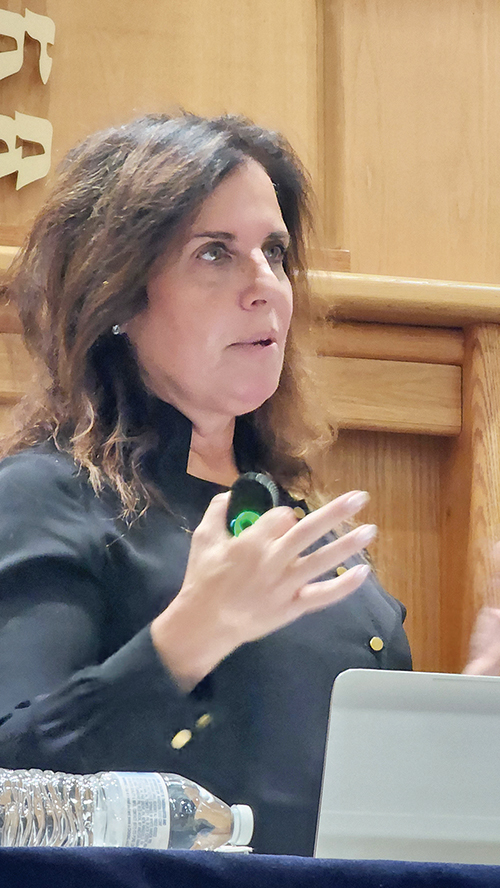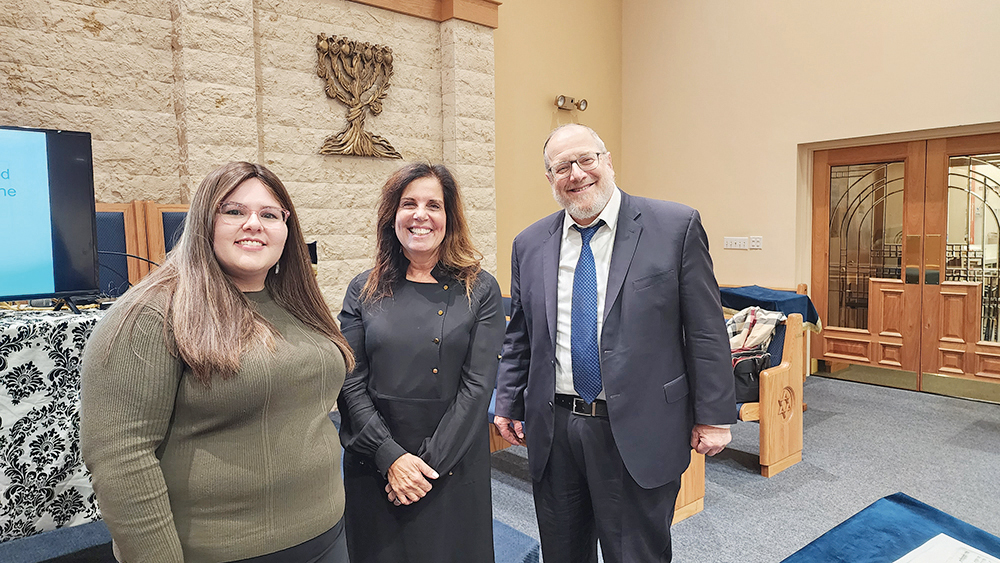
Approximately 75 people came to Highland Park’s Congregation Ohav Emeth (OE) after Shabbat on Nov. 11 to hear Dr. Barbara Lauer-Listhaus present “Addressing the Heartbreak in Israel and the Rise of Antisemitism.” A Hackensac-k and Livingston-based clinical psychologist for children, adolescents and adults, she presented tools, tips and techniques designed to gain emotional support in these challenging times as well as ways to help others.
As with other events that were planned prior to early October, event organizer Seema Dobin said that the original presentation topic pivoted from the generic “Strengthening Self-Resilience and Building a Better You” to focusing on creating positivity and resilience in the wake of news and social media presentations of constant images of war and anti-Israel/antisemitic activity.
OE’s Rabbi Eliyahu Kaufman opened the event with a welcome to all and thanked Dobin for arranging this “important talk with guidance needed at this time.” He continued, “This week’s parsha talked about the passing of Sarah and the impact it had on Abraham. It is hard to deal with loss and tragedy as an adult and even more so for children. This presentation is so appropriate to hear on many levels.”
In the spirit of community for which Highland Park/Edison is known, Kaufman noted that Rabbi Sariel Malitzky of Edison’s Congregation Ohr Torah was unable to attend because of the Israeli vendor market shuk being held at his shul. Kaufman urged everyone in attendance to go immediately to Ohr Torah following the talk.

Lauer-Listhaus began by stating that she has spoken on this topic several times since Oct. 7 and has revised her material each time as the situation keeps changing. “While sadly, pogroms and antisemitism are not unprecedented, they are unprecedented to many of us. Most of us are too young to remember the Holocaust and if adults are having difficulty understanding what is happening, imagine how children must feel. Adolescents understand what is going on, but don’t have the capacity to deal with their feelings. Expectations are changing, it is OK to feel vulnerable and not know the answer to every question. How best to provide the best messages to our children and others?
Incidents may have different impacts on people and the results may not be seen immediately. Lauer-Listhaus recalled that her father left a radio on in a basement room during the Six Day War. It had been on Shabbat and it felt important enough that news be available. Recalling hearing the radio announcer speaking about terrorists, Lauer-Listhaus recalled that for several years she believed there were terrorists in her basement. “Children absorb details but cannot process all the information they receive.” How can adults help them avoid psychological and emotional harm?
In order to help others, explained Lauer-Listhaus, people must first make sure they are taken care of. Analogous to adults putting on their oxygen mask prior to helping their children, adults must establish and maintain their own feeling of safety first. One of the best things to do is create the understanding that the Jewish people have faced challenges in the past and have taken action and moved forward. A child can understand that they studied for an exam they were worried about failing and tries to prepare better for the next exam. Thinking about what can be done proactively is very beneficial. Participation in Tehillim groups is a good response to anxiety as it helps connect with others in the group and prayer can be cathartic. Donating to charity, writing letters to Israeli soldiers, and putting up blue and white ribbons and signs of support are actions that feel positive and are better than falling into despair.
No two people will experience the emotional trauma we felt on Oct. 7 the same way. Some may have a similar reaction to Post Traumatic Stress Disorder (PTSD) that manifests after a physical stressful impact. Those impacted may find it difficult to communicate and relate to others. One member of the couple may find it helpful to talk out their emotions, while the other person prefers to keep things internal. Lauer-Listhaus recommended trying to understand the other person’s perspective while managing your own. “I know you prefer working things out on your own, but I need someone to talk this through with. Can you help me with that?”

She also reminded the audience not to be judgmental about how a person reacts or deals with the issue and provided a reminder to deal with children in an age appropriate fashion and not give them too much information that they cannot comprehend. If the child is having difficulty moving forward, suggest that they speak with a teacher or guidance counselor at school who may be able to help. Taking other positive actions to combat stress, such as exercise and physical activity, can be helpful.
At the Q&A session after the formal presentation, several attendees presented personal questions about their reactions to Oct. 7. In many cases, they unknowingly used some of the tools and techniques presented to help them find their own answers.
Melissa Krublit of Highland Park, came because “it is hard to find appropriate support other than immediate family and close friends. How can feelings be channeled in a positive way?” Krublit found these answers and had another personal reason to attend the event. “Dr. Lauer-Listhaus was my AP psych teacher in high school and she wrote one of my college recommendations.”
Later, at the Israeli vendor market, Irwin Hametz of Edison shared that what Lauer-Listhaus said “made a lot of sense and included good practical suggestions on what to do. Being here at the shuk is the fun part of the evening and a way to be positive.”
Deborah Melman is a staff writer at The Jewish Link.








